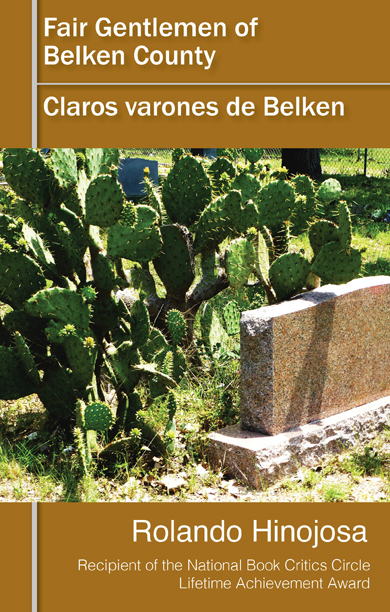National Book Critics Circle Lifetime Achievement honoree Rolando Hinojosa returns to Klail City—in Belken County along the Texas-Mexico border—to chronicle the lives of its residents. There’s friendship, “which can all of a sudden pop up at any time,” and death, which happens just as frequently.
The friendship between cousins Rafe Buenrostro and Jehú Malacara continues through war and peace. After returning from Korea, Rafe—like so many Mexican Americans—is advised to use the GI Bill to learn a trade, like building fishing boats. He and Jehú opt to attend the University of Texas. They get by working in the library and writing papers for other students. When a teaching assistantship becomes available, Rafe loses it because the secretary couldn’t locate him, confirming the fact that some Mexican Americans are sellouts.
Death comes knocking, in Korea and South Texas. Their childhood friends, Pepe Vielma and Charlie Villalón, died overseas, as did many other Klail City boys. Closer to home, old Esteban Echevarría is ready to call it quits, saying he won’t live another summer.
The sun rises and sets in Klail City. People fall in love, wrangle with God and sell their souls to the devil. Frequently compared to William Faulkner’s Yoknapatawpha and Gabriel García Márquez’s Macondo, Rolando Hinojosa’s fictional Klail City brings to life the Texas-Mexico border area in the twentieth century.
“Originally published in Spanish in 1981, this fourth installment of Hinojosa’s expansive, multigenerational Klail City Death Trip series set in a fictional county along the Texas-Mexico border captures the tumultuous atmosphere on university campuses during the Korean War. Written in the tone of a neighborhood gentleman regaling old friends, this bilingual novella will appeal to fans of Hinojosa, considered a foundational figure of Chicano literature.”—Booklist
“In a Faulkneresque braid of vignettes, Hinojosa continues to lay bare the soul of the Rio Grande Valley, following particularly cousins Rafe Buenrostro and Jehú Malacara though taking frequent detours into the lives, loves and losses of others in and around Klail City. Deeply satisfying as a portrait of things as they were (and continue to be) in this little-explored corner of the world, “Fair Gentlemen” abounds with Hinojosa’s wry, bemused compassion and his incomparable ear for the speech of Vallucos from every generation.”—The Monitor
“An absorbing read from beginning to end, Fair Gentlemen of Belken County / Claros varones de Belken is a deftly crafted novel that perfectly showcases author Rolando Hinojosa extraordinary literary talents, making it a very highly recommended addition to personal reading lists, as well as community, and academic library Spanish/English bilingual literary fiction collections.”—Midwest Book Review
“Like Faulkner, [Hinojosa] has created a fictional county, invested it with centuries of complex history, and populated it with generations of families and a host of unique characters.”—World Literature Today
“Although his sharp eye and accurate ear capture a place, its people and a time in a masterly way, his work goes far beyond regionalism. He is a writer for all readers.”—The New York Times Book Review
“Rolando Hinojosa is one of Texas’ most remarkable writers. The Klail City Death Trip Series is one of Faulknerian dimensions.”—Dallas Times Herald
“Rolando Hinojosa has established himself as sole owner and proprietor of fictional Belken County, which, like the author’s native Mercedes, is situated in the Lower Rio Grande Valley. If Belken is the Lone Star Yoknapatawpha, Hinojosa is its Faulkner.”—The Texas Observer
“…The Klail City Death Trip series continues to evolve both as a criticism and a celebration; altogether the novels constitute a lovingly accurate recreation of Valley people, politics, speech, social attitudes- even the weather.”—Austin American-Statesman
ROLANDO HINOJOSA, the Ellen Clayton Garwood Professor of Creative Writing at the University of Texas at Austin, is the recipient of numerous literary awards, including the National Book Critics Circle Ivan Sandrof Lifetime Achievement Award; the most prestigious prize in Latin American fiction, Casa de las Américas, for the best Spanish American novel in 1976; and the Premio Quinto Sol in 1974. His novels include The Valley / Estampas del Valle, Ask a Policeman, The Useless Servants, and Dear Rafe / Mi querido Rafa, all published by Arte Público Press. Several of his novels have been translated into German.









